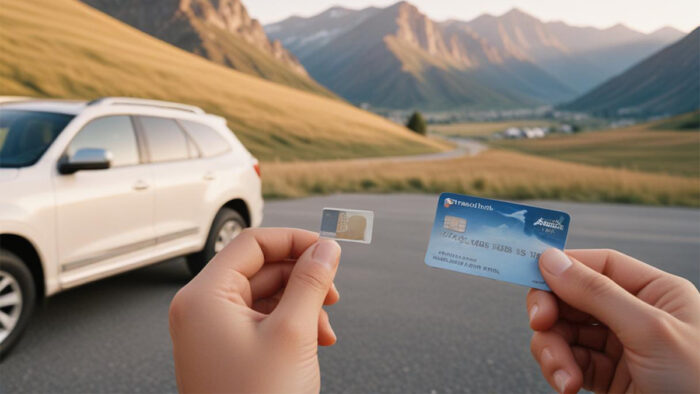Credit card rental car insurance covers the cost of damage to your rental car in the event of theft or accident. It comes in two forms: primary coverage and secondary coverage.

The primary rental coverage doesn’t require you to send a claim to your insurance company because it’s the first party to claim damages to your rental car.
There are several larger banks that offer you at least one premium card with primary rental car coverage, and these cards are designed for frequent travelers and come with a fee but no annual fees.
And for the secondary, after your personal policy has cleared its expenses for a rental car, the secondary car rental coverage that comes from your credit card kicks in. There are some situations where secondary coverage can take precedence over primary coverage.
How Does Credit Card Rental Car Insurance Work?
Credit card rental insurance varies, so make sure to read your card’s benefits guide to understand how to use it. Here’s how it typically works:
- Reserve a rental car with a credit card offering rental car coverage.
- Verify coverage, limits, and exclusions on your card.
- Present the same card at the rental agency.
- Decline the rental car company’s collision damage waiver.
- If they insist on their coverage, call your credit card company.
- Pay the full rental cost with the card that provides coverage.
In case of an accident, theft, or other covered event, file a claim with the credit card company within the given time frame. If coverage is secondary, file a claim with other applicable insurance first.
Keep it simple and follow these steps to ensure proper credit card rental insurance coverage.
What’s Excluded from Credit Card Rental Car Coverage?
Credit card rental car coverage applies to most situations, but some rentals may be ineligible. These types of rentals typically aren’t covered:
- Leases and mini-leases
- Rentals exceeding 31 days
- Exotic or antique cars
- Rentals in specific countries
- Commercial use vehicles
- Vans with over nine passenger seats
- Vehicles with an open cargo bed
- Motorcycles, mopeds, and motorbikes
Check your credit card’s terms and conditions to confirm coverage details before renting a vehicle.
How to File a Claim for Credit Card Rental Car Insurance
When filing a claim for credit card rental car insurance, follow these steps:
- Contact your card’s customer service immediately, even if you have up to 100 days to file a claim.
- Gather incident details, including date, time, location, and photos of the damage. Obtain a copy of the repair estimate and itemized bill.
- Call customer service to be connected with your card’s rental car insurance benefits provider. Find the claim number in your card’s benefits guide to call directly.
- File a police report if necessary, depending on local regulations. If not required, document whom you contacted, their phone number, and the date.
- Submit your completed claim form within 120 days of the incident.
- Provide all required documentation as requested by the claims provider, usually through fax, online, or mail. You may have up to a year to submit the paperwork.
- Respond promptly to any additional requests to ensure a smooth claims process.
Be proactive and organized when filing a claim to expedite the process and receive appropriate compensation for rental car damages.
Does All Credit Card Come With Car Rental Insurance?
Not every credit card provides insurance for rental cars. Travel credit cards and premium rewards cards are the main cards that offer these advantages. The advantages, limitations, and protections of credit cards that provide rental car insurance can differ significantly from one another.
Frequently Asked Questions
How do I know if my credit card has insurance?
Review your credit card’s terms and conditions or contact your card issuer to learn about your card’s insurance benefits.
What types of credit card insurance are available?
Common types include purchase protection, extended warranty, rental car insurance, travel insurance, and cell phone protection.
What is purchase protection?
Purchase protection covers damage or theft of eligible items purchased with your credit card within a specified time frame.
What does rental car insurance cover?
Rental car insurance typically covers damage or theft of a rental car when you pay with your eligible credit card and decline the rental company’s coverage.
How does travel insurance work?
Travel insurance provides coverage for trip cancellation, interruption, delays, lost baggage, or medical emergencies while traveling.
Is cell phone protection included with my credit card?
Some credit cards offer cell phone protection, covering damage or theft when you pay your monthly phone bill with the card.
Are there any exclusions or limitations with credit card insurance?
Yes, each type of coverage has specific exclusions and limitations, so be sure to review your card’s terms and conditions for details.



